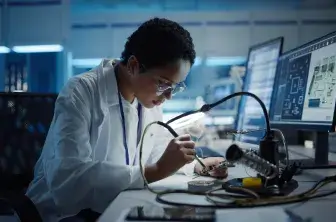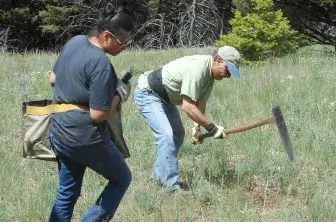Strategy 1: Prioritize Equity, Fairness, and Justice
Research Together with Communities

Scientific research is essential for continual innovation of the climate response. For too long, science has not adequately included the insights from indigenous and frontline communities. To correct this, researchers should build relationships with local communities and work with them when funding and designing projects.
Follow and expand existing promising practices for codeveloped research.
Prioritize funding to research projects that are codeveloped with local communities.
Recognize additional ways of knowing, such as Indigenous Knowledge.
More recommendations
Many of the research projects necessary to advance climate solutions are occurring in frontline communities, creating both risks and opportunities for these communities. Without diverse community voices, climate research can unintentionally reinforce existing power imbalances or lead to policies that increase local vulnerability. To avoid these outcomes, research projects should incorporate frontline communities’ knowledge and interests to ensure that benefits resulting from the research extend to those most affected by climate actions, and to strengthen communities’ adaptation efforts. A study in 2017, for example, evaluated recent evidence of the interactions between climate change, air pollution, and health, highlighting how low-income and minority communities have higher exposure to air pollution, a finding that strengthened policy and funding efforts to assist these communities.[i]
Follow and expand existing promising practices for codeveloped research.
Climate researchers have been leaders in establishing appropriate practices for equitable research involving local communities.[ii] Still, many researchers in mitigation and adaptation fail to adequately involve local input. Strategies for effective codevelopment of research include establishing relationships with communities before planning projects, using culturally sensitive research collection techniques, maintaining transparency and accountability with local researchers, and sharing data after project completion. Climate researchers should share not only the outcomes of their projects, but also promising practices for broadening community codevelopment. Researchers should not avoid projects on more challenging mitigation and adaptation issues but should seek to address distributional impacts and consider trade-offs within their studies.
Prioritize funding to research projects that are codeveloped with local communities.
To minimize community harm and build trust, research funding from government agencies and philanthropy should prioritize projects that promote codevelopment with community members. Projects that give local community members authority in project design or oversight should be funded over those that only hold listening sessions or other late-stage engagements.[iii] One example that used this codevelopment framework is the Ikaagvik Sikukun (Land Bridge) Project, in which Indigenous communities in Alaska participated in developing the research questions, as well as in data collection and implementation.[iv]
Another model for effective community engagement are microgrants: small community grants given by corporations or larger research grant recipients to invest in meaningful climate action within target communities. Microgrants not only offer direct benefits for the research project but also build trust between community members and corporations and help communities identify and learn to navigate other funding opportunities.[v] The Solutions Project provides microgrants to community climate organizations predominantly led by women of color, hastening adoption of green energy technology and strengthening resilience.[vi]
Recognize additional ways of knowing, such as Indigenous Knowledge.
We urgently need climate action, and increasing research speed at the necessary rate will ultimately require incorporating additional ways of examining and assessing the problems. Indigenous peoples have relationships with the land spanning millennia, giving them a deep understanding of how a changing climate has altered ecosystems.[vii] Indigenous Knowledge rooted in cultural practices, traditions, oral history, and language all document these changes. Despite a vast amount of valuable knowledge, Western scientists have often disregarded Indigenous science and observations. However, there is a growing recognition of the value of weaving Western and Indigenous knowledge systems together.
Permafrost Pathways, a research initiative in Alaska, is a partnership between Western scientists and policy-makers, and Indigenous leaders and residents.[viii] The project aims to use Indigenous Knowledge in combination with Western science to monitor permafrost thaw, an issue that poses significant risks to both the regional landscape and the global climate. Permafrost Pathways is also working to cocreate adaptation strategies with participating communities.
[i] Hans Orru, K. L. Ebi, and Bertil Forsberg, “The Interplay of Climate Change and Air Pollution on Health,” Current Environmental Health Reports 4 (5) (2017): 504–513, https://doi.org/10.1007/s40572-017-0168-6.
[ii] Maarten K. van Aalst, Terry Cannon, and Ian Burton, “Community Level Adaptation to Climate Change: The potential Role of Participatory Community Risk Assessment,” Global Environmental Change 18 (1) (2008): 165–179, https://doi.org/10.1016/j.gloenvcha.2007.06.002.
[iii] John Wiseman, Lara Williamson, and Jess Fritze, “Community Engagement and Climate Change: Learning from Recent Australian Experience,” International Journal of Climate Change Strategies and Management 2 (2) (2010), https://www.emerald.com/insight/content/doi/10.1108/17568691011040399/full/html?skipTracking=true.
[iv] Ikaaġvik Sikukun, “Ikaaġvik Sikukun ‘Ice Bridges,’” https://www.ikaagviksikukun.org/ (accessed June 12, 2023).
[v] Rev. Jasmine Beach-Ferrara, “Pay It Forward: A New Way to Fund Grassroots LGBTQ Organizing in the South,” National Committee for Responsive Philanthropy, August 23, 2017, https://www.ncrp.org/publication/responsive-philanthropy-summer-2017/pay-it-forward-a-new-way-to-fund-grassroots-lgbtq-organizing-in-the-south.
[vi] The Solutions Project, “What We Do: Together, We Revolutionize What’s Possible,” https://thesolutionsproject.org/what-we-do/ (accessed June 12, 2023).
[vii] Gregory A. Cajete, “Indigenous Science, Climate Change, and Indigenous Community Building: A Framework of Foundational Perspectives for Indigenous Community Resilience and Revitalization,” Sustainability 12 (22) (2020): 9569.
[viii] Alaska Institute for Justice, “Permafrost Pathways,” June 8, 2022, https://www.akijp.org/permafrost-pathways/.





